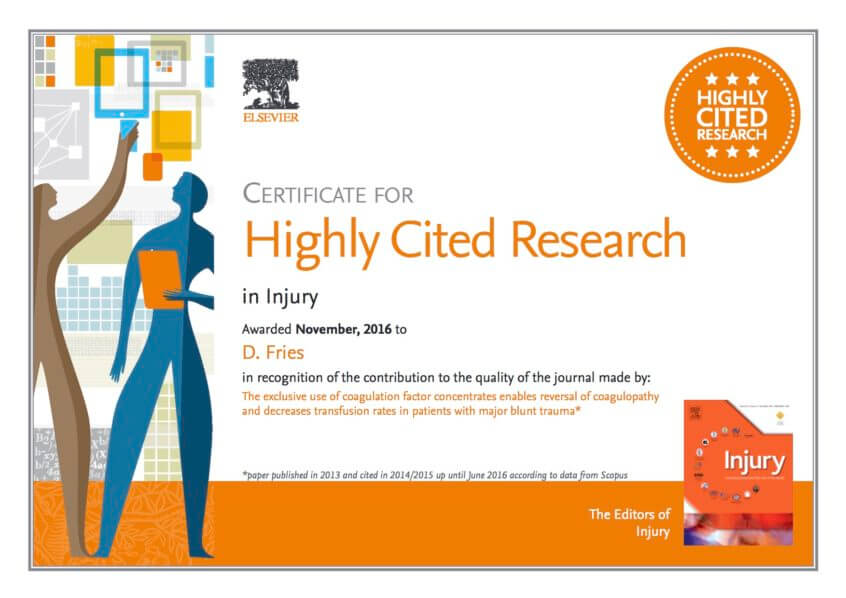Das Fachmagazin Injury hat unseren Kollegen Dietmar Fries für seine Mitwirkung an einem der in den letzten Jahren meistzitierten Artikel ausgezeichnet. Wir gratulieren ganz herzlich!
Dear Dr. Fries,
The editors of Injury are delighted to inform you that your paper, The exclusive use of coagulation factor concentrates enables reversal of coagulopathy and decreases transfusion rates in patients with major blunt trauma, published in 2013, is one of the most highly cited papers during 2014 and 2015. We would like to take this opportunity to thank you for publishing with us, and congratulate you.
Abstract:
Background: FFP and coagulation factor concentrates are used to correct trauma-induced coagulopathy (TIC). However, data on coagulation profiles investigating effects of therapy are scarce.
Methods: Thisisananalysisof144patientswithmajorblunttrauma((ISS) 15),whowereenrolledina prospective cohort study investigating characteristics and treatment of TIC. Patients who received fibrinogen concentrate and/or prothrombin complex concentrate alone (CF Group) were compared with those additionally receiving FFP transfusions (FFP Group).
Results: Sixty-six patients exclusively received CF, while 78 patients additionally received FFP. Overall, patients were comparable regarding age, gender and ISS (CF Group, ISS 37 (29, 50); FFP Group ISS 38 (33, 55), p = 0.28). Patients treated with CF alone showed sufficient haemostasis and received significantly fewer units of red blood cells (RBC) and platelets than did those also receiving FFP [(RBC 2(0, 4) U vs. 9 (5, 12) U; platelets 0 (0, 0) U vs. 1 (0, 2) U, p < 0.001)]. In addition, fewer patients in the CF Group developed multiorgan failure (MOF) (18.2% vs. 37.2%, p = 0.01) or sepsis (16.9% vs. 35.9%, p = 0.014) than in the FFP Group. Propensity score-matching (n = 28 pairs) used to reduce the impact of treatment selection confirmed that additional FFP administration showed no benefit in restoring haemostasis, but was associated with significantly higher transfusion rates for RBC and platelets.
Conclusion: The use of CF alone effectively corrected coagulopathy in patients with severe blunt trauma and concomitantly decreased exposure to allogeneic transfusion, which may translate into improved outcome.
